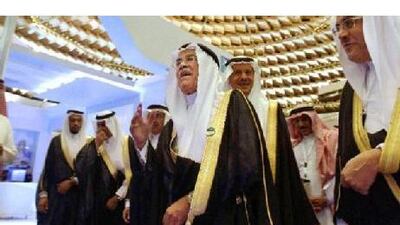A few dozen dedicated followers heeded Saudi Arabia's call to attend a Golden Jubilee celebration for OPEC in the marble-clad hall of the InterContinental Hotel in Riyadh - but even they appeared to be more absorbed by their BlackBerrys than what was being said.
The kingdom's minister of petroleum pronounced that oil would keep its grip on the world economy "whether we like it or not" for another 30 to 50 years but the sparse audience seemed to say otherwise.
"I think the oil era is probably over," says Ivan Sandrea, the vice president of exploration and production strategy for the Norwegian state oil company Statoil. "Oil is still very important but the world is growing based on other things."
Ample supplies of cheap fuel was a big factor in the unprecedented growth in the economies of the US and Europe during the 20th century. When supply was disrupted, as it was during the Arab oil embargo of 1973 and the Iranian revolution six years later, oil's impact left deep scars on consumers in the West, who endured shortages at petrol stations, rocketing inflation and job losses in the recession that followed.
But global growth today has shifted away from natural resources to services and technology. The emerging economies of the 21st century, such as China and India, pay top dollar for energy. Rather than cheap fuel, their stimulus is cheap labour and technology.
The oil economy has shrunk dramatically as a proportion of global GDP and even at $80 a barrel, a barrel of oil is still cheaper than the same amount of mineral water. OPEC ministers have been relegated to bystanders at world economic events.
Nowhere has this been more evident than in the global downturn, when oil was relegated to a bit part in the financial crisis and subsequent collapse in global growth.
Turmoil in financial markets drove oil prices to a record high of $147 a barrel in July 2008, only to plummet to $30 nine months later, forcing OPEC to make its largest ever cut in output.
Today, even if oil prices were to double in the wake of a supply shock, the IMF predicts global growth would fall 1.4 per cent at worst, while world inflation would rise by 1.5 per cent.
Some OPEC nations, too, are weaning themselves off oil dependence. Saudi Arabia, for decades solely a producer of oil, now has an industrial base that makes up 10 per cent of its economy.
Its non-oil sector is growing at 5 per cent and rising, offering the hope of careers to the millions of youths entering the job market. Its property market is buoyant and investors from luxury retailers to video animators are seeking to cash in on its emerging consumers.
The UAE is even further down the industrialisation route, with 16 per cent of the economy made up by non-oil industry.
While one half of the world remains transfixed by the fear of oil running out, oil exporters are much more concerned that demand for their natural resources may begin to fade.
Iraq, for decades unable to exploit its oil wealth due to sanctions during Saddam Hussein's reign, is on the cusp of a challenge to Saudi Arabia as the world's top producer.
The rate of growth in global oil reserves has slowed but consumer behaviour is also changing. Climate change is turning consumers away from hydrocarbons and China is just the latest superpower to pump billions of dollars into the search for an alternative to the combustion engine, which is the linchpin of oil's pre-eminence among transport fuels.
Technology is also playing a role in increasing supply. The industry currently extracts only about half the oil in a typical field and new techniques to lift this rate of recovery are unlocking huge new reserves from previously abandoned fields.
"We are experiencing a long-term transition in supply dynamics from easy oil to many energy sources that are complex, so the rate of growth in oil production over the next century will not be the same as the last century - but the resources to underpin the next century are there," says Mr Sandrea.
After the gyrations of the past 18 months, oil prices appear to have settled in the $70 to $80 a barrel range, far below the $200 price foreseen by Matthew Simmons, the oil financier and "peak oil theorist" who made a name for himself two years ago by predicting Saudi oil output would collapse.
The questions for economies of the Gulf that depend on oil revenues are: At what price will oil leave the stage and what is the optimal rate of reserves depletion?
King Abdullah of Saudi Arabia has said $75 a barrel is a fair price and the market has given it to him, for now. But Mr Sandrea says the private sector, which still pumps more than half of the world's oil, needs something closer to $50.
"Demand for oil will increase until the price chokes it off," says Bill Farren-Price, an independent oil analyst. "The price will deliver an alternative through a technological breakthrough. The Saudis need $75 but that might be too high."
The stewards of the world's oil reserves in the Gulf would never want to be accused of selling the family silver too cheaply, but neither do they want their successors to be left holding billions of barrels of oil they cannot sell.

